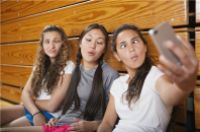
source: digest.bps.org.uk
欲翻译的小伙伴,可评论『领稿』,并把完成的译文贴在评论处。谢谢
A cute mistake that young children make is to think that they can hide themselves by covering or closing their eyes. Why do they make this error? A research team led by James Russell at the University of Cambridge has used a process of elimination to find out.
Testing children aged around three to four years, the researchers first asked them whether they could be seen if they were wearing an eye mask, and whether the researcher could see another adult, if that adult was wearing an eye mask. Nearly all the children felt that they were hidden when they were wearing the mask, and most thought the adult wearing a mask was hidden too.
Next, Russell and his colleagues established whether children think it"s the fact that a person"s eyes are hidden from other people"s view that renders them invisible, or if they think it"s being blinded that makes you invisible. To test this, a new group of young kids were quizzed about their ability to be seen when they were wearing goggles that were completely blacked out, meaning they couldn"t see and their eyes were hidden, versus when they were wearing a different pair that were covered in mirrored film, meaning they could see, but other people couldn"t see their eyes.
This test didn"t go quite to plan because out of the 37 participating children, only 7 were able to grasp the idea that they could see out, but people couldn"t see their eyes. Of these 7, all bar one thought they were invisible regardless of which goggles they were wearing. In other words, the children"s feelings of invisibility seem to come from the fact that their eyes are hidden, rather than from the fact that they can"t see.
Now things get a little complicated. In both studies so far, when the children thought they were invisible by virtue of their eyes being covered, they nonetheless agreed that their head and their body were visible. They seemed to be making a distinction between their "self" that was hidden, and their body, which was still visible. Taken together with the fact that it was the concealment of the eyes that seemed to be the crucial factor for feeling hidden, the researchers wondered if their invisibility beliefs were based around the idea that there must be eye contact between two people - a meeting of gazes - for them to see each other (or at least, to see their "selves").
This idea received support in a further study in which more children were asked if they could be seen if a researcher looked directly at them whilst they (the child) averted their gaze; or, contrarily, if the researcher with gaze averted was visible whilst the child looked directly at him or her. Many of the children felt they were hidden so long as they didn"t meet the gaze of the researcher; and they said the researcher was hidden if his or her gaze was averted whilst the child looked on.
"... it would seem that children apply the principle of joint attention to the self and assume that for somebody to be perceived, experience must be shared and mutually known to be shared, as it is when two pairs of eyes meet," the researchers said.
Other explanations were ruled out with some puppet studies. For instance, the majority of a new group of children agreed it was reasonable for a puppet to hide by covering its eyes, which rules out the argument that children only hide this way because they are caught up in the heat of the moment.
The revelation that most young children think people can only see each other when their eyes meet raises some interesting questions for future research. For example, children with autism are known to engage in less sharing of attention with other people (following another person"s gaze), so perhaps they will be less concerned with the role of mutual gaze in working out who is visible. Another interesting avenue could be to explore the invisibility beliefs of children born blind.
Refereces
Russell, J., Gee, B., and Bullard, C. (2012). Why Do Young Children Hide by Closing Their Eyes? Self-Visibility and the Developing Concept of Self. Journal of Cognition and Development, 13 (4), 550-576 DOI: 10.1080/15248372.2011.594826




